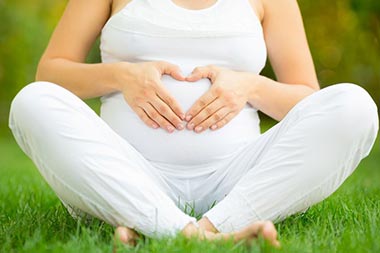You may be wondering why all this concern over teeth and gums, at a time when you just want to focus on the bringing the new baby into the world. However, just as your dental health affects other aspects of your life, it can affect your baby, too. This special time in your life calls for special attention to your health and well-being—and that includes your dental health.
Up until only a couple of generations ago, there was a general perception that when a woman starts having children her teeth go bad. She would ‘lose a tooth for every child’. To account for this, it was perfectly acceptable for many women for have their teeth removed pre-emptively and replaced with dentures shortly after she was married. It was thought that this would save a lifetime’s worth of dental bills. Thankfully, we see things a little differently these days!
Pregnancy itself does not cause the teeth to go bad or ‘lose their calcium’. However, it is true that the hormonal changes and symptoms that occur during pregnancy do result in changes to the environment in the mouth and this can result in dental problems. These potential problems are totally preventable with appropriate knowledge and care—and certainly does NOT justify removing a woman’s teeth!
Pregnancy and your teeth
The first way that pregnancy can influence your oral health is by giving you the munchies. The urge to snack between meals is common to many pregnant women—particularly on things that are sweet or sour. The carbs, sugars and acids often found in snack food provide a nice meal for the decay-causing bacteria that live in your mouth. Pregnancy cravings can also be very unusual snacks for the pregnant mother and therefore are usual for the mouth too.
Morning sickness and reflux is a significant factor that causes changes in the mouth. When stomach acids enter the mouth, it softens the enamel and overtime can result in permanent erosion of the tooth surface. Also, when the saliva is acidic for extended periods, it provides an environment that decay-causing bacteria love and so they multiply, resulting in more bad bacteria in the mouth. They then produce more acid themselves which causes decay in the teeth. This why we often see more decay lesions than usual during pregnancy.
Pregnancy and your gums
Gum disease during pregnancy is what really concerns gynaecologists because of its effect on the pregnancy itself. The elevated levels of progesterone that go with pregnancy seem to increase the way the gums react to the plaque that builds up on your teeth due to bacterial action. This can result in a condition called pregnancy gingivitis, in which the gums become red and inflamed, and may even bleed. Research has found that gum disease in a pregnant woman can be linked to low birth weight and preterm birth. Gum disease is essentially a low grade infection that can travel through the body, triggering an immune response that limits the baby’s development and may lead to premature delivery.
There’s also a condition with the unappealing name of ‘pregnancy tumors’. These lumps on the gums result from an overgrowth of gum tissue. They typically appear during the second trimester, and show up as red, raw growths that bleed easily. They usually resolve after the baby is born. It’s believed that pregnancy tumors are another hormone-triggered reaction to plaque that builds up between the teeth. If you experience these lumps, consult with your dentist.
Thus, it’s important to continue to see your dentist while you’re pregnant. Yet many women skip this important part of prenatal care. In a recent study, half of the expectant mothers surveyed reported that they put off getting dental care even when they were in pain in part because they erroneously believed the dental procedures would harm the baby. Sadly, these women may have been putting their babies at greater risk by delaying dental care.
Because healthy teeth and gums are so important to a successful pregnancy, the Australian College of Obstetricians and Gynaecologists recommends that pregnant women get an oral exam along with their first prenatal check-up, as well as continuing with needed dental care while expecting.
At Bite Dental, we’re well-versed in the particular needs of the expectant moms we treat, so be sure to let us know as soon as you know the good news! In fact, if you are thinking about starting a family, we suggest you schedule a dental exam and cleaning before you become pregnant. This will give us time to identify and correct any problems that might otherwise get in the way of your happy pregnancy.


